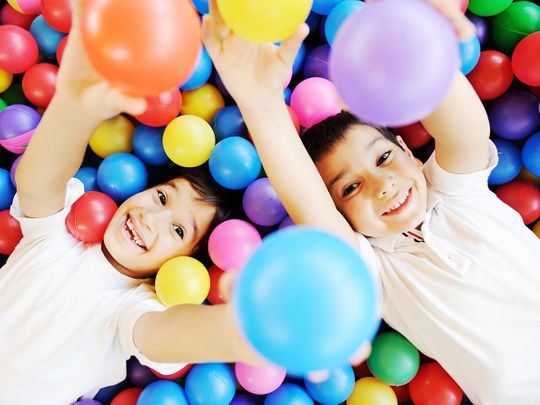
This summer, Nigerian expat and mum-of three Ifiok Ikeagu introduced a new concept to her kids: Reflection time. For about 10 minutes every evening they must sit down with their notebooks and think, about what new thing they’ve learned that day and what they can improve on the next. It’s okay to write these insights down, or to draw them, says the Abu Dhabi-based teacher, but it’s not okay to have a blank page. “If by the time it’s time for reflection you’ve not learned something new, then you go pick up the dictionary and learn a new word. So learn one thing new for the day,” she says.
“It’s working out so well – the discussion time we have now is so much richer,” says the 38-year-old, whose children are 11, 9 and 4.

Come summertime when the schools give way to the much anticipated (by kids) break, families are left with clear canvases to work on. And that, of course, can go two ways – it may turn out a beautiful picture or a wasted period.
Did you know, asks Kalthoom Ali, Chairperson of the UAE-based non-profit Education Business Group, that according to a study in 2020, students experience an inevitable decline in academic skills and are susceptible to lose up to 40 per cent of the gains they have made over the school year over summer?
So how can one provide an environment rich with learning and yet not too rigid with discipline? It’s all about balance believe the experts.
UAE-based mum of four and life coach Wafa Khan explains: “People tend to either believe in structure or in complete free time over the holidays. If you have a blend of both, that’s a good idea.”

I don’t structure bedtimes. But for some parents, it’s a good idea because then they can wake up earlier and do things – such as play dates and activities – in the afternoons.
One must consider what equation works for their family. “In my personal experience, I don’t structure bedtimes over the summer break,” says Khan. “Because we live in a part of the world where the days are really hot and kids cannot play outside. But we can have late evenings, go out as a family. But for some parents, it’s a good idea because then they can wake up earlier and do things – such as play dates and activities – in the afternoons.”
And between shifts of play, say experts, it’s important to allow kids to do a little ‘nothing’. “When kids get bored, that’s when they evolve best. So if they are bored they can just play with cardboard. They can get creative. On normal school days, their days are so packed that they don’t get the time to express their creative side so much,” explains Khan.
Reading is key: There are countless summer library reading programmes, designed with themes and incentives to get young learners on board. Parents are also invited to try summer reading and bucket lists to keep literacy fun for kids, while still encouraging them to read what they like.
Teach through play: Parents can also incorporate more challenging subjects such as mathematics into daily activities including baking, gardening and sports, helping children to keep their minds refreshed and learning as they go. Thirty-one-year-old Rheema R. Menon, for instance, says: “ I look forward to bonding with my six-year-old daughter who is about to enter primary school. She actively participates whenever I clean the home and I use this time to teach her household skills such as cooking, cleaning, gardening and laundry.”
Online classes: Learning can take place virtually with numerous summer camps, coding classes, educational mobile or tablet applications, and online programmes that are great learning tools for all topics across all school levels.
Volunteering: This is an effective way to enhance children’s social skills and increase awareness of their society. For older kids, working a summer job means learning the kind of interpersonal and interactive skills that can be of practical importance moving forward.
Anishkaa S Gehani, mum of two and Founder and CEO of Dubai-based public relations firm Yardstick Marketing, says it’s imperative that kids have a holiday routine in place. “Holidays just mean children have more time to pursue their passion and work on their hobbies, or even experiment with a new skill, contributing to the overall development,” she explains. Her game-plan over summer is:
1. Doubling down on play-time: “We also try and participate in as many group activities as possible – it’s a great way to ensure kids develop social and interpersonal skills,” says Gehani.
2. More reading: “We try and add an additional reading hour during the holidays, and ensure we make buying books an experience by doing our online research and visiting a bookstore,” she adds.

We also try and participate in as many group activities as possible – it’s a great way to ensure kids develop social and interpersonal skills.
3. New year, new sport: “With a variety of indoor sports in Dubai, we try to ensure we try out a new sport every summer, while continuing with our sport of interest,” says Gehani.
4. Explore and experiment: “We allocate time for experimenting and exploration – It could mean trying out different activities or different cuisines or even a new destination,” she adds.
5. Home décor: “We ensure we get creative by sprucing up our rooms with few elements which are hand-made or some new home décor,” she says.

While keeping some structures in place – routine offers comfort and respite to children – offer autonomy and choice in others, suggest the experts. Kirstan P. Lloyd, Clinical Psychologist at UAE-based Reverse Psychology, offers the following tips:
Healthy eating: “I feel that children are more likely to follow our example rather than listening to what we tell them. As such, parents need to be mindful of what their eating habits are modelling for their children,” she says.
“Simple things, like preparing/ordering a side salad at every meal can be a way for children and parents to eat a balanced meal without too much thought, especially if we make it habitual. We can also explain that children need to finish their healthy foods in order to enjoy treats, rather than limiting treats altogether,” she explains.

Simple things, like preparing/ordering a side salad at every meal can be a way for children and parents to eat a balanced meal without too much thought, especially if we make it habitual. We can also explain that children need to finish their healthy foods in order to enjoy treats, rather than limiting treats altogether
Screen time: “One of the most powerful things I have ever read with regards to screen time is the concept that if we want our children to not be on their devices, we need to give them a reason to put them down! In other words, by providing warm connections, fun activities and entertainment we are more likely to cajole our children away from their devices,” she adds.
For younger children, says Lloyd, allow them a set amount of time each day during the summer holiday and ensure that they have other activities to do when they're not on their devices. For teens, this can be a bit more tricky as their devices are often a life-line to their friends and social world. However, instead of limiting devices, we could try and set daily family activities which are device free: like a morning walk, going for coffee together, having dinner as a family.
Plan activities: If children have too much free time, they are likely to nibble their way through the pantry or have endless screen time. If we keep the holiday too structured, they may feel as if they haven't had a holiday.
While travelling, parents can ensure that they plan activities as a family to get the children out and about. If they are at home, things like summer camps or classes can be wonderful, she suggests. Indian expat Rheema R. Menon says she keeps her six-year-old daughter engaged with clay.”I have seen her make different kinds of objects using clay. This also enhances her motor skills. I encourage her to read books and also narrate stories. Since we live in a community, we use this time to swim and play with other kids.”

I have seen her make different kinds of objects using clay. This also enhances her motor skills. I encourage her to read books and also narrate stories. Since we live in a community, we use this time to swim and play with other kids.
And then there are board games such as Monopoly, Ludo, Snake and Ladders, which are a favourite, she says.
Listen to your child: We need to be mindful of what activities our children will enjoy and how much structured time they will enjoy. There is no one size fits all and each child is different in their needs. Check in with your child and invite them to weigh in on some of the decisions (for instance, which summer camp grabs their attention or how much time they'd like to spend relaxing at home).
Self-care: Being focused on kids should not mean ignoring your own needs or wants. “It is okay to normalise being a normal parent who also needs down time over the summer to rejuvenate. This may mean we disengage and have afternoon naps or that we let our children watch a bit more TV than usual. It is also okay for us to treat ourselves and look after our own needs as well (for instance, a regular yoga practice without the family),” says Llyod.
Social needs: While increased family time is one of the joys of the summer holidays for many, it also means that our children may miss their friends or spending time with others their age. Lonely children can often end up struggling to maintain healthy habits and may over-indulge in unhealthy choices or present as withdrawn or moody. Each child will have different social needs, but by being attuned to our children, we can try to ensure they have enough opportunities to socialise with like-minded children their age in a way which is fulfilling and engaging.
How parents can engage kids at home
Canadian expat Amberly Frenken-Metzler says that one of the things that she’s been doing for her six year old is creating challenges, such as:
Summer Reading Challenge: “Basically we are taking a picture of every book he reads this summer and will make a collage he can bring to his new teacher in August,” she says.
Scavenger hunts: “These are great if you do them early morning in Dubai; they can be outside. Some examples are collect:
- Three different coloured stones
- Three different coloured leaves
- A plant that has flowers
- A plant that doesn’t have flowers
- A plant you can eat
- A plant you don’t eat
- Something ‘man-made’
- Something you only find in Dubai
- Something that doesn’t belong in the garden
Measuring challenges: “You give them a list of household things, a pen and a tape measure and they will stay busy,” she says.
Screen time: Not all online time is bad. “I also make sure to include some screen time for older which right now includes ‘Zelda’ on his Nintendo. He only has 40 minutes a day but later we do challenges about this as well where he draws the new characters/heroes or bad guys. I find when I give him a simple challenge like that he creatively evolves it on his own and he has actually been creating comics now about his video game!”
Teach through travel
One of the best ways to engage kids is through travel; it teaches them about places and people; and equips them with skills to navigate life. UAE-based Taylor Elizabeth Perramond, etiquette and personal brand advisor and certified life and emotional intelligence coach, offers the following tips to make travelling with kids easy, fun and more empathetic.
Get physically prepared: “Like any project in life, being prepared by having everything you need for the journey is paramount. An essential tip when preparing and packing is to remember that what you think your child needs and what they need or want in times of travel may not be the same.

I recommend conducting test runs with your children, having them sit for extended periods, and entertaining them as they will be on the plane. Talk to them about their journey, and get excited about their experiences, especially if they have not travelled before.
“Think strategically and in steps of the trip. Instead of preventing issues, think more about what will entertain and occupy your child, what will soothe them in times of distress and how they can spend their time while traveling,” she adds.
Prepare yourself (and your children) emotionally and mentally. She explains: “I recommend conducting test runs with your children, having them sit for extended periods, and entertaining them as they will be on the plane. Talk to them about their journey, and get excited about their experiences, especially if they have not travelled before.
“Express what one can do while you are on the plane and give them a barometer to understand acceptable and unacceptable behaviour. The car is a great place to start these conversations on your run to the grocery store or longer trips to family members' houses.
“If your child is too young to have these conversations, I suggest you still have them. You would be surprised how empowering parent-to-infant pep talks are. The idea is to get yourself in the mindset of traveling, keeping your cool, and having everything together.”
Involve your children in the act of travelling. Once you are in the airport, try to avoid giving them an iPad and expecting them to be quiet from the get-go. Instead, let them be an active participant in traveling. You could do this in many ways, from explaining what is going on, giving them manageable tasks and responsibilities, so they feel like “little helpers,” and applauding them when they manage their tasks and behaviour, says Elizabeth Perramond.
“Introduce your children to people you come in contact with that are open to being engaged with you. Use your travel experience as a continuous educational opportunity by pointing out different things in the airport and giving them names. You can ask your children to spot other things or colours along the way or when having to sit still to keep them mentally engaged.
“It may seem more exhausting to take these additional steps, but simply engaging your child in the process and journey of traveling rather than forcing them to contain themselves makes the experience of travel so much more dynamic, educational and fun for everyone.”
Think and act like a teacher. “Watch them kindly and constructively. Make comments about their behaviour and offer suggestions to keep them on track. This positive feedback will help them build confidence and understand their expectations.
“Continuously having feedback will lay the foundation for being a good traveller and build upon it each time you travel. The essential tip here is to use a similar recognition or acknowledgment system your child uses at school. This way, they identify and assimilate these life lessons as they do those things they learned in school, as information rather than restrictions,” she adds.
Prepare for the worst and then lean into it when it happens. Suppose your child has had enough and is melting down. Remember that this is expected. Drop what you are doing, lean into them, and tell them it will be okay. This moment is only a tiny portion of your journey, and it too shall pass.
Have consideration. Use your best manners with the airline staff and travellers around you. Your children are watching and learning from you about what it means to travel, and this includes your behaviour and emotional state.
Swiss mum to six-year-old twins Delia Heuckeroth says finding ways to keep the kids entertained gets easier as they get older, for you feed their interests. For now, she allows them to go on playdates, hang out with neighbours’ kids and plan, for their trip home to their home country. The only real structure, she says, is bed time – they sleep at about 8pm and wake up at 6am. “At least so far,” she laughs.

For Ikeagu, life is about learning – and as an educator and mum she takes her job to teach seriously. She offers her children the opportunity to weigh in on the things they want to do, then imbues each activity with learning. “I ask the children, what would you like to do this holiday? And they have their list. And then of course I also influence that list so that learning will continue. So one of the things I make sure we have is books. So these books, they choose them- so when I give them the choice to pick books according to their interest [they are more interested in reading and absorbing that knowledge],” she explains.
Have a topic you'd like us to discuss? Write in to parenting@gulfnews.com








